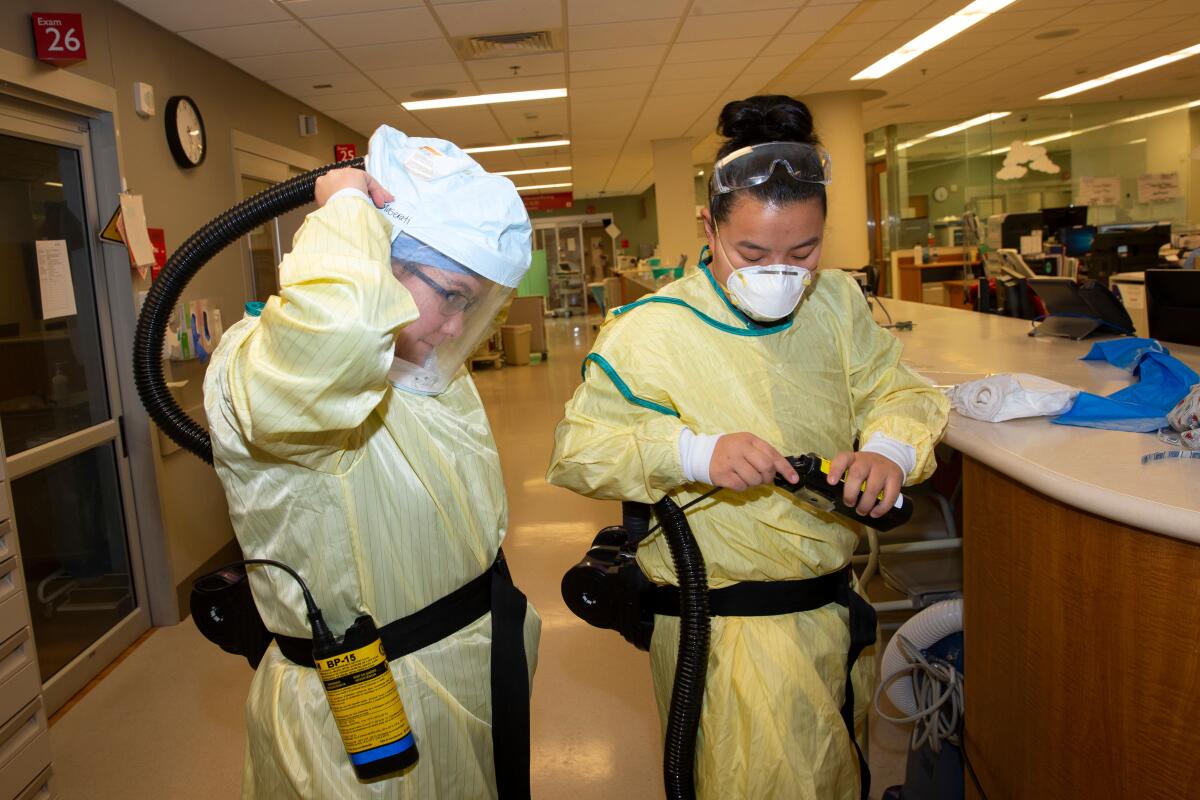Op-Ed: Nurses are crucial to the pandemic response. Why aren’t they on Biden’s COVID-19 board?

Despite widespread distrust in American institutions, trust in nurses remains high — and could serve as a powerful tool in the fight against COVID-19, which poses the greatest health threat in a century.
For 18 years in a row, Americans have rated the honesty and ethics of nurses highest among a list of professions in an annual Gallup poll. In 2019, 85% of respondents gave nurses a “high” or “very high” rating in trust, higher than any other profession. The public also holds nurses’ efforts to improve the U.S. healthcare system in the highest regard, above any other profession, according to a New York Times/Harvard T.H. Chan School of Public Health report on American values and beliefs about national health insurance reform.
Nurses have earned accolades around the world for their frontline contributions to the pandemic response. Then why are there no nurses on President-elect Joe Biden‘s COVID-19 advisory board?
The glaring absence of nurses on the board is a missed opportunity that risks further setting back efforts to tame the pandemic. The board is composed of 13 preeminent public health experts, including physicians, epidemiologists and infectious disease specialists. The deep expertise and experience of nurses should be called upon to help tame COVID-19. It’s not too late for the incoming Biden administration to remedy this oversight and add nursing representation to the board.
Nurses have always stood at the nexus of medical decisions, nursing care, patients’ needs and family concerns. The pandemic has only accelerated the pace and raised the stakes for nurses to balance these roles. When an intensive care unit doctor intubates a COVID patient and puts the person on a ventilator, the nurse assists in placing the tube and calls the patient’s family to share updates. Nurses make the minute-to-minute treatment adjustments that help keep COVID patients alive. When a hospital experiences a virus surge, nurses juggle patients to ensure those with COVID receive the care they need while keeping other patients safe from the virus.
Nurses know the communities where they work, and those communities trust nurses. We rely on nurses as our first line of defense against the virus, and community trust in them will be crucial to educate and reassure wary patients receiving future vaccines in community clinics, hospitals and nursing facilities.
When patients get COVID-19, nurses explain the disease process to them and concerned family members. They go over the medical team’s efforts to help their relative survive and recover. Nurses explain the complex care delivered to the patient to frightened families overwhelmed with trying to understand everything happening in an ICU, with its ventilators and nests of intravenous lines that keep people alive.
Since the coronavirus is disproportionately striking minority communities, these patients and their families may also be facing an avalanche of other pandemic-related devastation. This might include job loss, the threat of eviction, fears of getting tested due to immigration status, language barriers and distrust of the healthcare system because of the systemic racism they have faced. In areas where the nearest hospital may be several hours away, nurses in community clinics may serve as the first point of contact for a sick patient.
When hospitals run out of personal protective equipment, nurses pay dearly. More than 1,500 nurses worldwide have died from COVID-19. Most nurses — many of whom are women, and many of color — don’t have the luxury of walking off the job to protect themselves. While labor unions have attempted to hold large healthcare systems accountable for worker safety, significant problems such as dangerous understaffing persist and will likely grow as hospital beds fill and the pandemic wears on.
Although more men are entering the profession, women still account for about 90% of nurses in the U.S. Historically, society hasn’t given the caring and important labor performed by women the respect and compensation it deserves. The World Health Organization may have designated 2020 the Year of the Nurse, in honor of the 200th anniversary of Florence Nightingale’s birth, but we must do more than just dedicate a theme year to nurses and praise them as “healthcare heroes.”
Appointing nurses to the Biden COVID-19 advisory board would bring a wealth of insight to high-level strategy sessions on how to fight the pandemic. It would also go a long way toward helping regain the trust of burned-out healthcare workers.
Stacy Torres is an assistant professor of sociology in the department of social and behavioral sciences at UC San Francisco. Andrew Penn is a psychiatric nurse practitioner at San Francisco VA Medical Center and an associate clinical professor at UC San Francisco.
More to Read
A cure for the common opinion
Get thought-provoking perspectives with our weekly newsletter.
You may occasionally receive promotional content from the Los Angeles Times.










